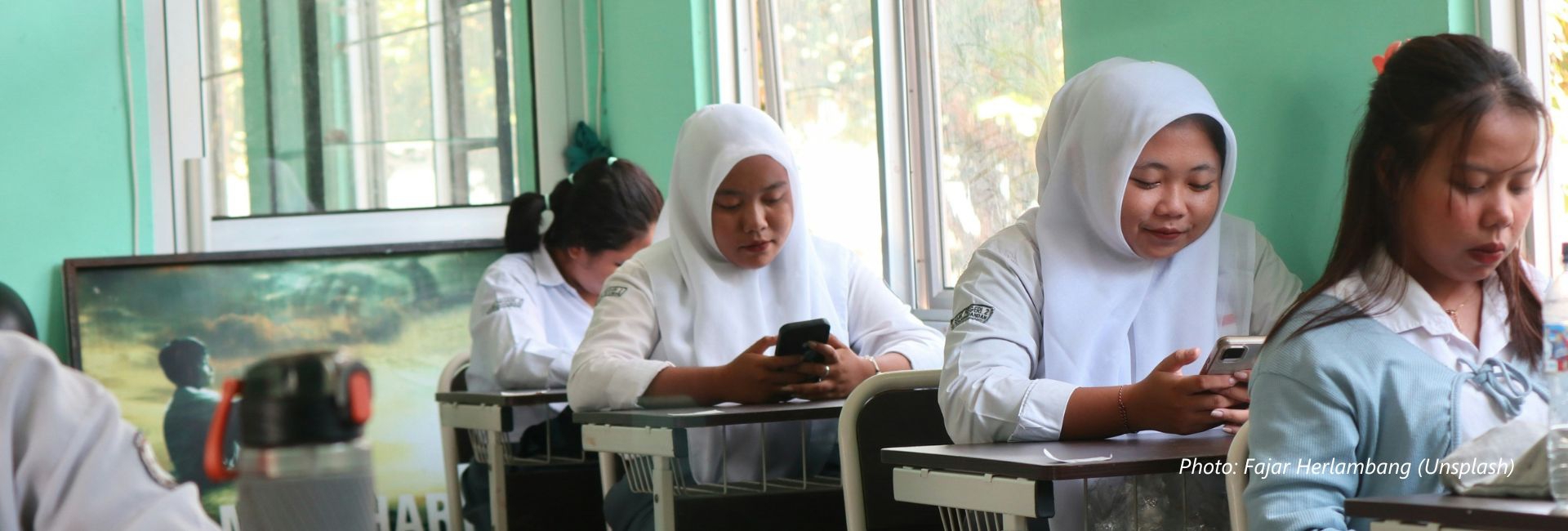The rapid expansion of digital technology has transformed societies worldwide, opening up new opportunities for learning and social interaction. Yet, unchecked exposure to digital content also poses risks to children's social, intellectual, and mental health (Hollis, Livingstone, and Sonuga-Barke, 2020; Lonergan, Moriarty, McNicholas, and Byrne, 2021). Nonetheless, evidence also suggests that digital spaces can be leveraged to implement interventions that help mitigate or prevent the growing incidence of mental health issues among children and adolescents (Bergin et al., 2020).
Recent data reveals that 15.5 million Indonesian youth (34.9%) faced mental health challenges in 2021. Despite depression rates of 2% among 15–24 year-olds—higher than the national average of 1.4%— only 10.4% seek treatment. Barriers include inadequate mental health awareness, limited knowledge about accessing help, and stigma.2 These statistics underscore the importance of targeted programs to raise mental health awareness and strengthen support systems for young people, particularly young women.
Since 2024, Save the Children Indonesia has implemented the First Click project to strengthen digital child protection through youth empowerment, capacity building, and government partnerships. Building on this foundation, Save the Children Indonesia plans to expand the initiative in 2025–2026 with funding from Save the Children Hong Kong International. The expansion will integrate a mental health and psychosocial support (MHPSS) component, addressing critical gaps identified by the Ministry of Women Empowerment and Child Protection (KPPPA) and aligning with national priorities for MHPSS integration in child protection.
To support this expansion effectively, a comprehensive baseline study is needed to map existing gaps in MHPSS integration and pinpoint opportunities for enhancing digital child protection. SMERU, working with Save the Children Indonesia, undertakes a study to establish a clear picture of current digital child protection systems while evaluating the readiness and capabilities of children, parents, teachers, and key stakeholders to address digital protection challenges.
This project supports the government’s efforts to integrate mental health into child protection by generating data and lessons learned to guide more effective interventions.
This study aims to achieve the following objectives:
- Assess the integration of MHPSS within the digital child protection system using the five clusters of child rights
- Examine caregivers’ capacity in digital parenting and support for their children’s MHPSS
- Evaluate children’s and adults’ digital competencies and their link to children’s well-being
- Assess child protection stakeholders’ capacity in digital safeguarding and MHPSS
- Explore the Digital Youth Council’s capacity to advocate for child protection and well-being through meaningful participation
This baseline study uses a mixed-method approach to capture digital competencies and capacities of children and adults, as well as to assess how MHPSS is integrated into digital child protection systems. It focuses on Grade 7 students (including children with disabilities), their parents/caregivers, and key stakeholders from schools, government agencies, and non-governmental organizations at both provincial and national levels in Jakarta.
The quantitative component involves self-administered online surveys at two public schools in East Jakarta (SMPN 268 and SMPN 52), targeting approximately 500 students, 500 parents and 20 teachers. Additional online surveys will capture perspectives of relevant stakeholders, such as government and members of Digital Youth Council.
For the qualitative component, the study includes 21 in-depth interviews and 10 focus group discussions. These explore children’s digital experiences, MHPSS needs, and child protection challenges, with particular attention to cyberbullying, stigma, and gender norms. Respondents include children, parents, teachers, government officials, and representatives of child-focused organizations.
A comprehensive desk review of relevant policies, laws, and literature will supplement the field data to provide a complete picture of the current digital child protection and MHPSS landscape.



